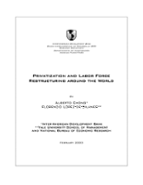Privatization and Labor Force Restructuring around the World
Date
Feb 2003
Critics of privatization argue that poor labor force restructuring is a key concern and that governments should establish better retrenchment programs. Using new data from a random sample of 400 companies in the world, we test competing theories about the wisdom of retrenchment programs and their effect on prices paid by buyers and re-hiring policies by private owners after privatization. Our results show that adverse selection plagues retrenchment programs carried out by governments before privatization. Controlling for endogeneity, several labor retrenchment policies yield a negative impact on net privatization prices. In confirmation of the adverse selection argument, various types of voluntary downsizing lead to a higher frequency of re-hiring of the same workers by the new private owners. Compulsory skill-based programs are the only type of program that is marginally associated with higher prices and lower re-hiring rates after privatization, but the political and economic costs of this policy may make it somewhat impractical. A qualified do not intervene appears to be the safest bet with respect to labor retrenchment before privatization.



